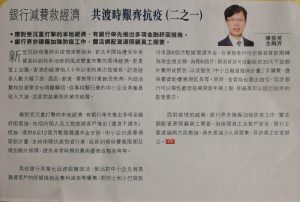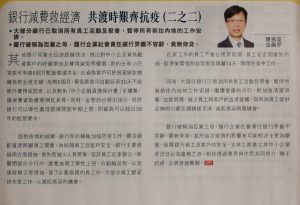

Translated version of Capital Weekly Legislative Councillor’s Column
Banks Cut Fees to Save the Economy Tiding over Difficult Times and Fighting the Epidemic Together
The novel coronavirus pneumonia is gathering a menacing force and is adding fuel to the fire in the already plummeted Hong Kong economy, which has suffered a “double hit” last year due to the China-U.S trade conflict and the disturbances arising from the proposed legislative amendments. The economy in Hong Kong has plunged into negative growth for the first time in ten years. As the number of tourists visiting Hong Kong has tumbled, hotels, restaurants, retail and such industries suffered considerably. Both internal consumption and investment demands have also weakened significantly. Income of small and medium-sized enterprises (SMEs) and their employees in related industries have been greatly decreased, and they are facing the threat of closures and unemployment.
To deal with a severely hit local economy, a bank has taken the lead to launch various financial relief measures, including the implementation of “interest-only loan payments” for individual and corporate customers, offering a 6-12 month principal moratorium period; introducing a special loan scheme for SMEs to relieve the epidemic impact; providing support to enterprises that manufacture medical and anti-epidemic supplies; offering insurance grace periods and additional protection; and offering fee concessions or waivers during this critical period.
Other banks have followed suit by introducing relief measures speedily to reduce the financial burdens for SMEs and trade finance customers, as well as offering fee reductions; allowing taxi and public minibus operators to defer principal repayment for up to six months; eligible customers can apply to convert part of their available trade loan facility into an overdraft facility for six months; automatic extension of trust receipt for 30 days without additional fees or penalty interests; and handling fee waiver offer and guarantee fee subsidy for “SME Financing Guarantee Scheme” to be extended etc. At the same time, the Hong Kong Monetary Authority has issued guidelines by allowing banks to exercise flexibility on the mortgage loan tenors, which may exceed 30 years, the upper limit of supervisory requirement in normal circumstances.
In the face of this epidemic threat, the banking industry has been working actively to combat the epidemic by deploying resources flexibly to cater for the needs of employees. Banks mainly adopt two types of measures to ensure the safety of staff and customers: firstly, by reducing the gathering of personnel in offices, employees are allowed to work from home. Apart from closing some of their branches, measures such as flexible work shifts, split-team arrangements and telecommuting are implemented. Except for staff providing essential services, most staff are arranged to work from home to minimise the chance of infection.
Employees who work from home will not take up their own annual leave; while staff who have travelled to the Mainland recently are required to serve 14-day mandatory home quarantine upon returning to Hong Kong and work from home during this period.
Concurrently, most banks have cancelled all employee activities and gatherings, as well as suspended all work arrangements which involved travelling to the Mainland. The branches that continue to operate will enhance their cleaning and disinfection, install additional barriers, reduce direct contact between staff and customers, and provide staff with adequate masks and alcohol hand sanitizers to reduce the risk of infection.
The banks serve as the conduits of our economy which have an indefeasible obligation to assume a role in corporate social responsibilities. As the current epidemic impact may be more serious than the SARS situation, the immediate priority lies in protecting the safety of bank employees and customers and supporting businesses, especially to assist SMEs to bounce back from the trough. It is believed that fighting the epidemic through the joint efforts of the banking industry and the public will definitely help us tide over the hard times together.
